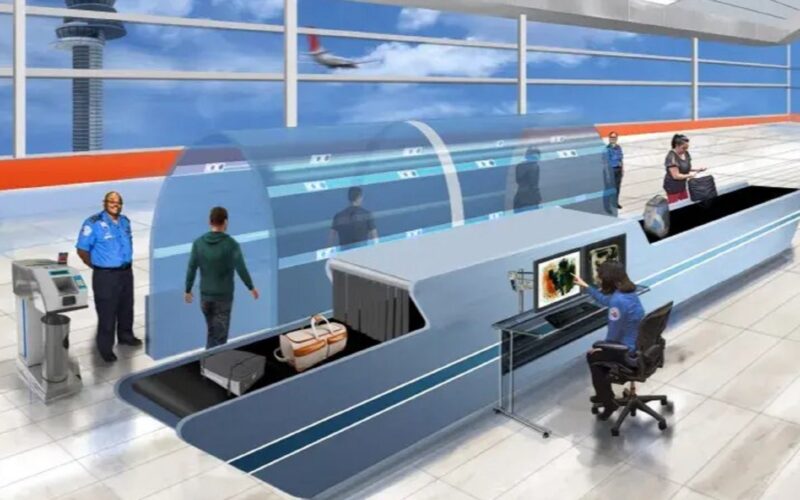The Transportation Security Administration (TSA) has unveiled a new self-service screening system at Harry Reid Internation Airport (LAS), United States (US).
The prototype system was revealed to US media on March 6, 2024, with the first live passengers expected to begin using the self-service screening from mid-March 2024.
The hope is that the self-service technology will allow airports to process thousands of passengers more efficiently each day.
Instead of passengers interacting with TSA staff as they pass through hand luggage screening and body scanners, interactive video monitors will be in place to offer guidance.
The video monitors will provide step-by-step instructions for passengers to complete screening at their own pace and once all checks are complete automated exit doors will open to let travelers through.
If any issues arise during the self-scanning process, then passengers will receive on-person alarm information enabling them to resolve the situation themselves rather than being pat-down or going through a secondary screening procedure.
While there is minimal assistance from Transportation Security Officers (TSO), they will be on hand for assistance as needed.
ONLY AT LAS! ✈️ The @TSA is testing new self-screening technology. TSA PreCheck® passengers at T3's Innovation Checkpoint will be the first to have the option to use the new system. Check it out ⤵️ pic.twitter.com/lmCHFJlnzf
— Harry Reid International Airport (@LASairport) March 7, 2024
“We are constantly looking at innovative ways to enhance the passenger experience, while also improving security,” TSA Administrator David Pekoske said. “This self-service prototype allows our trusted travelers to complete the screening process at their own pace. Testing at the Innovation Checkpoint in Las Vegas gives us an opportunity to collect valuable user data and insights and explore opportunities to apply parts of the prototype to other airport security checkpoint.”
TSA PreCheck passengers at TSA’s Innovation Checkpoint will be the first travelers to have the option to use the new system later this month.
TSA will collect passenger feedback and data on the system’s performance, design, cybersecurity, human factors, and other variables to inform future design requirements and system development and to understand how passengers and TSOs interact with the system.
The new system has been put in place in partnership with the Department of Homeland Security (DHS) Science and Technology Directorate (S&T).
“The number of airline passengers continues to increase year-over-year, creating a need for innovative screening solutions that enhance transportation security and make traveling more efficient,” DHS Under Secretary for Science and Technology Dr. Dimitri Kusnezov said. “At S&T, we are pushing the envelope with new technologies and concepts toward designing the airport of the future. Self-paced screening is one step toward building that future.”

